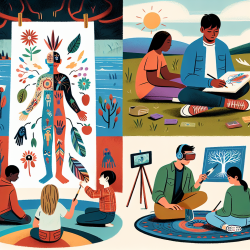Introduction
In the realm of speech-language pathology and online therapy services, understanding the diverse coping strategies of youth is crucial for enhancing mental health outcomes. The study "Exploring coping strategies and mental health support systems among female youth in the Northwest Territories using body mapping" provides invaluable insights into the self-identified strategies used by young women in the Northwest Territories (NWT) to manage mental health challenges. This blog aims to explore these findings and suggest ways practitioners can incorporate these strategies into their practice.
Key Findings from the Study
The research utilized body mapping, an arts-based qualitative method, to explore coping strategies among female youth in the NWT. Thematic analysis revealed five prominent themes:
- Grounding via Nature: Many participants found solace and strength in nature, which provided a grounding force and a refuge from societal pressures.
- Strength through Indigenous Cultures: Connection to Indigenous cultures and traditions served as protective factors, helping participants build resilience and cope with mental health issues.
- Connection to God and Christian Beliefs: Spirituality and religious beliefs were significant sources of strength and safety for many participants.
- Expression Using the Arts: Art provided a therapeutic outlet for emotional expression and self-discovery, enhancing self-confidence and coping abilities.
- Relationships with Social Supports: Interpersonal relationships with family, peers, and school counselors were crucial for maintaining mental health.
Implications for Practitioners
Practitioners working with youth can draw on these findings to enhance their therapeutic approaches:
- Incorporate Nature-Based Activities: Encourage outdoor activities that allow youth to connect with nature, providing a calming and grounding experience.
- Promote Cultural Engagement: Facilitate opportunities for youth to engage with their cultural heritage, which can bolster resilience and identity.
- Support Spiritual Exploration: Recognize the role of spirituality and encourage youth to explore their beliefs as a source of strength.
- Utilize Arts-Based Interventions: Integrate art therapy techniques to help youth express emotions and build self-awareness.
- Foster Supportive Relationships: Strengthen support networks by involving family and peers in the therapeutic process and providing training for school staff.
Encouraging Further Research
While this study provides a foundational understanding of coping strategies among NWT youth, further research is needed to explore these strategies in diverse populations and settings. Practitioners are encouraged to contribute to this growing body of knowledge by conducting their own research and sharing findings with the community.
To read the original research paper, please follow this link: Exploring coping strategies and mental health support systems among female youth in the Northwest Territories using body mapping.










